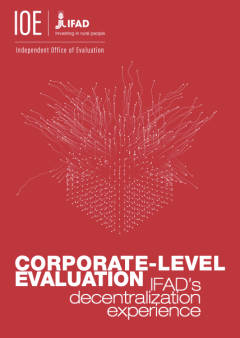
Corporate-level evaluation IFAD's decentralization experience
This evaluation concludes that decentralization is necessary to improve the development results achieved on the ground. However, decentralization needs to be done right and realize this potential. Decentralization efforts since 2016 have enjoyed strong support and commitment from IFAD’s Senior Management. However, there is a clear need for more strategic planning, careful resource allocation and fit-for-purpose country presence of IFAD.
The evaluation offers recommendations to address gaps in IFAD’s decentralization experience and pave the way for the next phase. Among these, before proceeding further, IFAD should take stock of its efforts to date and make the necessary corrections to the course of Decentralization 2.0. To do so, it should allow sufficient time to apply adaptive learning processes to address shortfalls and put in place appropriate decentralization actions.
IFAD should also learn from its successes during its earlier experience with decentralization and ensure that country presence has the necessary conditions and staff with necessary experience and skill sets to deliver IFAD’s mandate. It should pay sufficient attention to minimize the disruptions to the operations cycle and to the lives of its employees while pursuing reassignment and reallocation.

